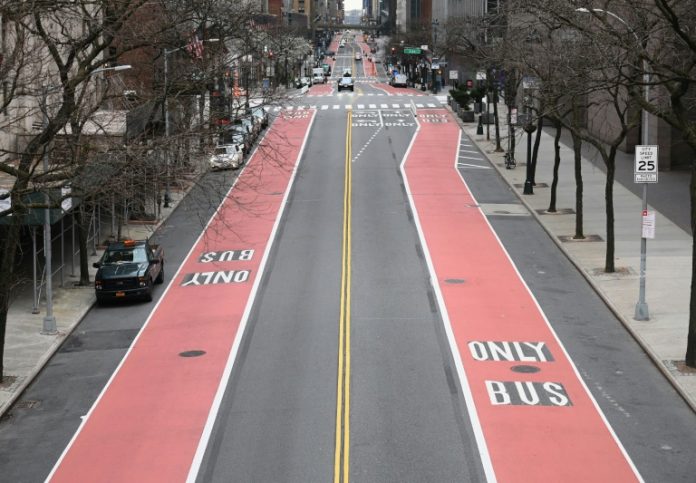The US Senate was poised to pass a massive relief package on Wednesday for Americans and businesses ravaged by the coronavirus pandemic as New York hospitals braced for a wave of virus patients.
The United States, with over 55,000 confirmed cases, has the third-highest number globally, behind China and Italy, and about half of them are in New York, the epicenter of the US outbreak.
“We still have the trajectory going up,” said New York Governor Andrew Cuomo, adding that about 12 percent of the people who test positive require hospitalization.
Cuomo said health officials anticipate about 120,000 coronavirus cases coming into New York’s hospitals and hospital capacity is only 50,000 beds.
The current figure is around 30,000, he added, with 285 deaths.
He said the evidence suggests that the strict stay-at-home orders in New York and social distancing measures have slowed the rate of hospitalizations.
Just over half the US population is now under stay-at-home orders as the authorities around the country seek to stem the spread of the virus.
Wall Street stocks jumped in early trading as the markets awaited a vote on the $2 trillion package hammered out by congressional leaders to boost the US economy.
The Dow Jones Industrial Average was up 2.6 percent at 21,244.77 points, the broad-based S&P 500 gained 1.4 percent to 2,482.04 and the tech-rich Nasdaq rose 1.0 percent to 7,489.38.
On Tuesday, the Dow soared 11.4 percent, notching its biggest one-day percentage gain since 1933.
– ‘We have a deal’ –
After an acrimonious partisan debate, Republicans and Democrats in the Senate reached agreement overnight on the relief package.

“At last, we have a deal,” Senate Majority Leader Mitch McConnell said, hailing the massive “wartime level of investment into our nation.”
It will put cash directly into the hands of Americans hard hit by the crisis, provide grants to small businesses and hundreds of billions of dollars in loans for larger corporations including airlines.
The relief package would be the biggest emergency injection of money into the US economy in history, dwarfing even the bailouts of 2008, when a worldwide financial crisis sent the US economy into a tailspin.
The Senate was to convene at noon (1700 GMT) and vote on the bill, which will then go to the House of Representatives and on to President Donald Trump for his signature.
With infections rising from coast to coast, the Senate bill proposes around $130 billion for hospitals in dire need of protective gear, intensive care beds and ventilators.
Trump tweeted early Wednesday that four hospitals being built in New York with federal assistance “are moving along very well, ahead of schedule.”
“Many additional ventilators also delivered,” he said.
Trump had voiced hope on Tuesday that the country could begin to reopen by Easter but his top infectious disease advisor, Anthony Fauci, said the timetable would need to remain “very flexible.”
Trump faces a reelection battle this year and his campaign has been upended by the global pandemic.
He said on Tuesday that social distancing has caused too much pain to the US economy, adding that he “would love to have the country opened up and just raring to go by Easter.” Easter Sunday falls on April 12.
Later, Trump appeared to retreat from his Easter goal at a news conference alongside Fauci.
“We’ll only do it if it’s good,” Trump said, adding that the reopening could be limited to a “portion” of the nation.
Trump on Wednesday praised Japan’s decision to delay the Tokyo Olympics.
“Congratulations to Prime Minister Abe of Japan, and the IOC, on their very wise decision to present the Olympics in 2021,” Trump tweeted. “It will be a great success, and I look forward to being there!”
More than 800 people have died from the coronavirus in the United States, according to a tracker maintained by Johns Hopkins University.
In the Florida tourist hotspot of Miami, beaches and parks were closed, their entrances sealed off by police yellow tape.
Docks and marinas were closed to avoid a repeat of the beach parties splashed across the news last weekend.
“It’s hard when you live alone to be even more alone, but I think we’re lucky to live at a time when friends are within reach on Whatsapp, said Rosa Jimenez-Cano, a 39-year-old Spaniard that has lived in Miami for two years.
“And we have a lot of digital entertainment that allows us to make this much more bearable”.
















